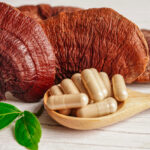How one medicinal mushroom promotes metabolic health and boosts immunity
 (NaturalHealth365) Natural healers have advised the reishi mushroom, which grows on trees in warm, humid parts of the world for over 2,000 years, to boost immunity, fight depression and fatigue.
(NaturalHealth365) Natural healers have advised the reishi mushroom, which grows on trees in warm, humid parts of the world for over 2,000 years, to boost immunity, fight depression and fatigue.
For example, this study highlights the potential of reishi mushrooms – which are botanically classified as Ganoderma lucidum and known in Traditional Chinese Medicine (TCM) as “lingzhi”- to act against obesity by modulating and balancing the gut microbiome. To learn more about the therapeutic powers of this intriguing food known as the “Mushroom of Immortality,” keep reading.
Reishi mushrooms may help combat obesity by improving gut health
A healthy, balanced gut microbiome – or community of gut bacteria – is vital for preventing metabolic conditions and obesity. As a prebiotic food capable of fueling microbes, reishi mushrooms provide valuable support for the microbiome. In a new review of literature conducted by researchers at the Hefei Institutes of Physical Science of the Chinese Academy of Sciences and published in Food and Functions, researchers reported that polysaccharides in reishi mushrooms could improve gut health by favorably affecting the ratio between two different types of gut bacteria.
Additional studies showed that consumption of reishi mushroom extract helped to prevent gut inflammation, inhibit the development of fat tissue, and decrease the accumulation of harmful bacteria – thereby helping to discourage obesity. While it should be noted that gut bacteria can also be influenced by exercise, diet, and genetics, reishi mushrooms appear to help “tip the scales” toward metabolic health.
Could reishi mushrooms boost immune defense – and even help strike back against rapid cell division?
Reishi mushrooms are high in compounds such as beta-glucans, amino acids, and polysaccharides, which are believed to inhibit rapid cell division and protect against cell mutations. One controlled trial published in International Immunopharmacology showed that 5.4 grams of reishi mushrooms a day for twelve weeks increased the number of white blood cells in people with advanced colorectal cancer, while another study showed that they could improve the function of lymphocytes, the white blood cells that engulf and destroy pathogens. The scientists reported that reishi mushrooms appear to have the ability to modulate immune activity but called for more studies to further explore benefits and safety.
In a separate review, the authors acknowledged that past studies on reishi mushrooms have shown mixed results. But they concluded by suggesting that reishi mushrooms be given along with conventional therapeutics to stimulate immunity and enhance the quality of life in people with dis-ease. By the way, reishi extract’s antibacterial, antiviral and antifungal qualities may help the body fight off unwanted infections.
Mushrooms may lower the odds of depression
Close to 5 percent of all American adults report regular feelings of depression, causing the Centers for Disease Control and Prevention (CDC) to deem depression a significant public health problem. Symptoms of depression can include feelings of guilt, low self-esteem, impaired concentration, disturbed sleep, and changes in weight.
A study conducted by scientists at Penn State suggests that reishi, as well as other types of mushrooms, can ease depressive symptoms – and even lower the risk of developing this condition in the first place! In a large population-based study involving 24,000 adults and published in the Journal of Affective Disorders, scientists found that people who ate mushrooms had lower odds of feeling down.
The team speculated that an antioxidant amino acid known as ergothioneine – which is, in fact, found in all mushrooms – could be behind the compelling results. While common white button mushrooms were used in the study, researchers believe that reishi mushrooms, rich in beta-glucans and ganoderic acids, might be among the best mushrooms to consume – and may provide even more “bang for your buck” than other types. (Just chalk it up to one more beneficial effect from the reishi mushroom.)
Adaptogenic reishi mushrooms can help the body and mind deal with stress
While reishi mushrooms are considered edible, their bitter taste and tough texture cause them to be more popular in extract form. Before supplementing with reishi mushrooms or extracts, consult with an integrative physician or experienced health coach.
Integrative healthcare providers typically recommend reishi extracts in amounts ranging from 1.5 grams to 9 grams a day, but your own doctor can advise you. Look for high-quality extracts made from organic reishi and certified to be pure. The label should also show both the country of origin and the extract ratio. For maximum benefit, take reishi extract in the morning on an empty stomach.
It should come as no surprise that the reishi mushroom is officially classified as an adaptogen or substance that helps the body deal with stress. If you’re feeling a little stressed, run-down, or “stretched thin” lately, it might be time to give this medicinal mushroom a try.
Sources for this article include:
Physiology.org
Healthline.com
MedicalNewsToday.com
NIH.gov
ScienceDirect.com
CDC.gov



